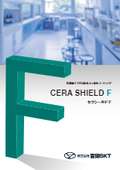[Surface Treatment Case] Protecting Robots from Corrosion with Fluorine-based Corrosion-resistant Coating
What are the methods to enable robots to exist in harsh environments? We will introduce surface treatments (coatings) that implement corrosion prevention measures such as robot covers.
■Sites Requiring Surface Treatment - Environments where corrosion of robot arm covers is a concern - Sterilization environments using UV - Environments requiring cleanability ■Points of Innovation - By applying a corrosion-resistant coating to robot arm covers, we protect the metal from many acids, alkalis, solvents, and other chemicals. - The surface is resistant to degradation even in special environments such as UV, making it suitable for protecting robots. - It offers superior cleanability compared to metal, allowing for safe use even in conditions where food may adhere and create a breeding ground for bacteria. - It enhances efficiency in sites where "environment" and "atmosphere" have been bottlenecks, raising concerns about equipment deterioration. ■Examples of Coatings for Improving Robot Transport Adhesion Issues - Teflon Coating (Fluororesin Coating) - Antistatic Fluororesin Coating "Safron" - Antistatic Fluororesin Coating "Safron AP+" - Organic-Inorganic Composite Coating "Cerashield" - Fluorine-based Room Temperature Coating "Cerashield F" *For more details, please download the PDF or feel free to contact us.*
Inquire About This Product
Related Videos
basic information
■Coating Resistant to Chemicals Coatings using Teflon fluororesin and similar materials are rarely corroded by chemical agents such as acids and alkalis. Additionally, by increasing the thickness of the coating, it prevents strong chemicals from penetrating to the substrate. ■Coating with Suitable Processing Temperature for the Substrate Teflon coatings and fluororesin coatings typically undergo heat treatment at around 400°C. For robot arm covers, materials like aluminum castings can be used, and applying fluororesin or fluorine-based coatings at lower temperatures can reduce damage to the substrate. *For more details, please download the PDF or feel free to contact us.
Price range
Delivery Time
Applications/Examples of results
■Teflon Coating (Fluoropolymer Coating) - PFA Coating - ETFE Coating - EFEP Coating - Modified Type ■Antistatic Fluoropolymer Coating "Safron" - YE-702 (PFA) - YE-710 (PTFE) ■Antistatic Fluoropolymer Coating "Safron AP+" AP-734P (PFA) AP-735E (ETFE) ■Organic-Inorganic Composite Coating "Cerashield" - CST-1508 (Heat-Cured Type) - CST-1108 (Room Temperature-Cured Type) ■Fluorine-Based Room Temperature Coating "Cerashield F"
catalog(7)
Download All Catalogs



News about this product(1)
Company information
To maximize the performance of manufacturing equipment and machine parts, Yoshida SKT derives the "optimal solution" tailored to our customers from hundreds of surface treatment technologies. - Decreased productivity due to adhesive troubles - Instability in product quality due to friction - Early deterioration of equipment due to corrosion We respond to these challenges in the manufacturing field with our extensive track record and reliable technical expertise. In 1963, we began fluoropolymer processing. In 1968, we signed a licensing agreement with DuPont (now Chemours), supporting manufacturing innovations for over 2,000 customers across various industries, from automotive to medical and aerospace. Furthermore, in 2024, we are focusing on the development of next-generation products, such as PFAS-free coatings, contributing to the advancement of sustainable manufacturing. With a three-base system in Nagoya, Tokyo, and Yamaguchi, we flexibly respond to both mass production and custom orders. Our consistent quality management system ensures that we deliver reliable quality. For solving challenges in the manufacturing field, trust the surface treatment experts at Yoshida SKT.







![[Coating Example] Food Machinery Parts (PTFE・PFA)](https://image.mono.ipros.com/public/product/image/8e0/2000493614/IPROS81896690695890946835.jpeg?w=280&h=280)
![[Coating Example] Non-stick Performance Scissors](https://image.mono.ipros.com/public/product/image/a5b/2000467547/IPROS502267123250952836.png?w=280&h=280)



![[Case Study] Unable to manage the dimensions and shapes of parts that undergo surface treatment.](https://image.mono.ipros.com/public/product/image/2068203/IPROS7764406603704587704.png?w=280&h=280)

